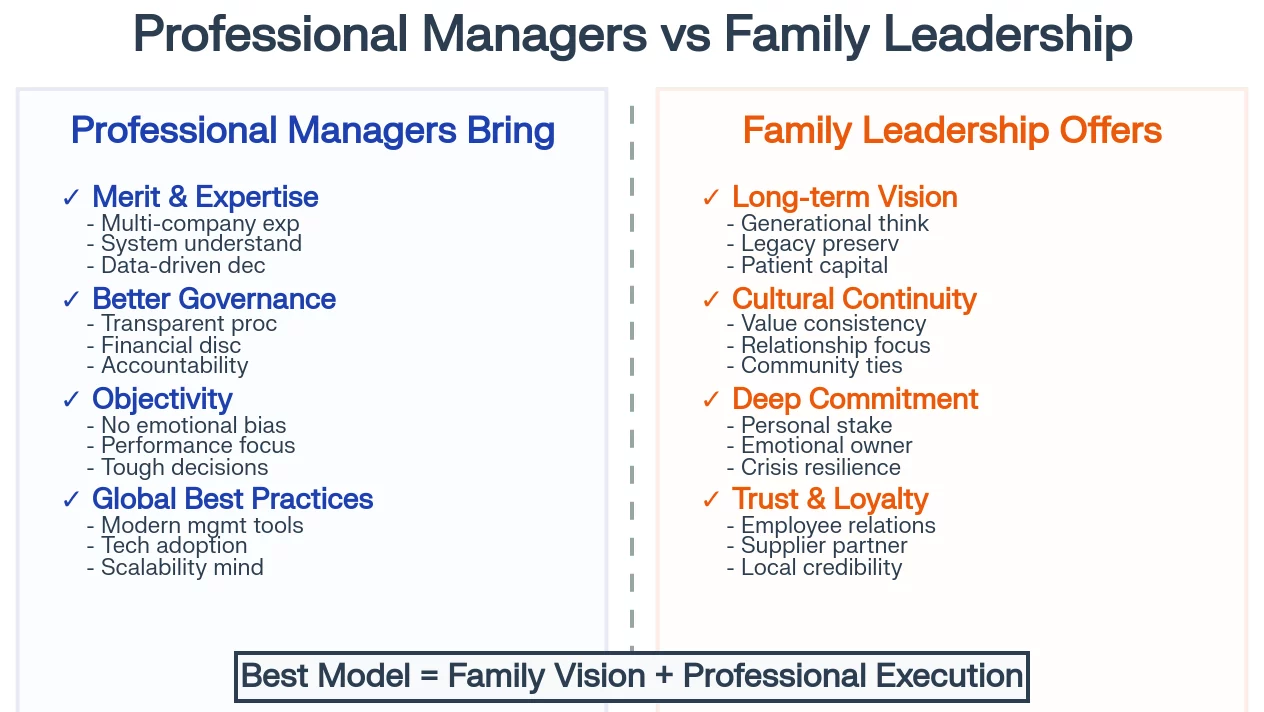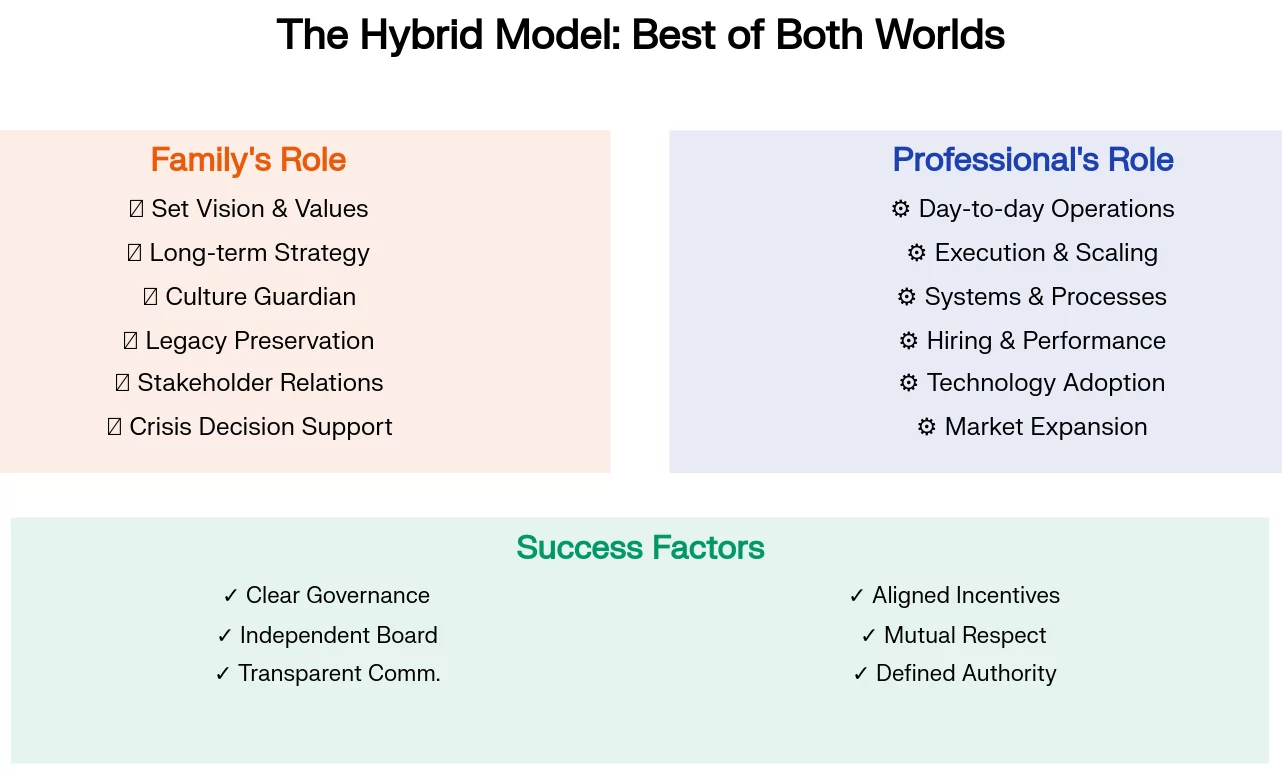Can professional managers succeed in family-run businesses?
Family-run businesses have always been a pillar of India’s economy. From Tatas and Birlas to Bajaj, Reliance, and Godrej, generations of families have built companies that define the Indian trade and industry. But as these enterprises grow larger and compete globally, a big question arises: Can professional managers in family businesses succeed?
Professional Managers in Family Businesses: Setting the Context
India is home to thousands of family-owned businesses, small and large. Together, they contribute nearly 80% of the country’s private sector output. These businesses collectively employ more people than the government and contribute more to our GDP than you’d think.
Here’s the kicker — only one in ten of these businesses makes it past their grandchildren. Traditionally, control stays within the family and is passed from generation to generation. A grandfather starts a thriving business, a father takes it to new heights, and is succeeded by the son. So naturally, after decades, everyone thinks, “Let’s get some professional management in here!”
With increasing competition, globalisation, and the demand for professional management, many of these firms are bringing in non-family CEOs and managers. But does it actually work? That’s where the tension lies — between legacy and professionalism, or in simpler terms, control versus competence.
Yes, Professional Managers in Family Businesses Can Succeed:
There are several strong arguments in favour of professionals leading family firms.
1. Merit and Expertise
Professionals bring a certain level of expertise and objectivity that many family members may not have. They’ve usually worked in multiple organisations, understand systems deeply, and can make tough decisions without emotional bias.
For example, N. Chandrasekaran, who rose through the ranks at TCS, now heads the Tata Group, one of India’s largest family-founded conglomerates. His leadership shows stability and forward-looking growth.
2. Better Governance
Family businesses often operate with informal decision-making. Professionals introduce structure, transparent processes, financial discipline, and accountability. This is critical when companies want to go public or attract global investors.
Groups like Godrej and Murugappa have successfully transitioned by empowering professional CEOs while the family focuses on long-term strategy.
3. Bridging Generational Transitions
In many cases, family successors are either too young or uninterested. A professional manager ensures continuity during these transitions, helping the business evolve without losing its identity.
Wipro – A Leading Example:
Wipro is a classic instance to be remembered about when the founder knows when to step back from the top position. Azim Premji built Wipro from a vegetable oil company into an IT giant. He knew he couldn’t run everything himself, so he brought in professional CEOs who were neither family members nor childhood friends. He was an actual professional who knew technology better.
It worked because Premji was secure enough to let them do their jobs. He didn’t control every decision; he set the vision to be executed.
Lesson: The family must be eager and ready for professional management. Do not just hire professional managers in a family business to look modern.
Prepare for CAT GDPI Topics
Now, that you have crossed the first hurdle of cracking the CAT exam, it’s time to focus on the next stage. It’s about preparing for Group Discussion (GD), Written Ability Test (WAT) & Personal Interview (PI) round from the IIMs and other prestigious B-Schools like XLRI, FMS, MDI, SP Jain, NMIMS and SIBM.
During the GD-WAT-PI selection process, you compete with the best of the best and it is but natural that you would want to be coached by the leading experts in the field of Personality development and GDPI training.
Learn more, How to Prepare for CAT GDPI Topics
But Success Isn’t Always Easy
Now let’s look at the points which strongly oppose the idea of having professional managers in family businesses:
1. Resistance to Change
The biggest challenge is trust and control. Many family promoters still like to make the final call, even if they’ve hired professionals. When professionals aren’t truly empowered, frustration builds and attrition follows.
Many promising managers have left mid-sized family firms simply because every decision had to be “approved by the owner.”
Example: Infosys
Narayana Murthy founded Infosys. By 2014, all the founders had retired, and the company needed fresh leadership. So they hired Vishal Sikka, who was from SAP, super bright, and had global experience.
But, within three years, he had to quit in frustration. Why? Because Narayan Murthy and the founders who owned less than 13% of the company kept publicly criticising Vishal. Questioned his salary, his strategy, his acquisitions, everything.
Sikka stayed three years, and when he left, he said: The founders interfered too much.
Lesson: One can’t hire professional managers and micromanage them like interns. It doesn’t work.
2. Cultural and Emotional Differences
Family businesses thrive on loyalty and long-standing relationships, while professionals focus on systems and performance. These worlds often clash. Professionals think about KPIs and quarterly results; families think in decades and emotions. Unless both sides learn to respect each other’s approach, friction is inevitable.
3. Succession and Identity
Sometimes, even successful professionals face a ceiling. No matter how capable they are, the top role may still be “reserved” for a family member. That limits ambition and discourages long-term commitment.
Example: The Tata Group
After Ratan Tata stepped down as chairman in 2012, they brought in Cyrus Mistry, who wasn’t even a Tata. He came from the Shapoorji Pallonji family. Four years later, he was out in a single board meeting.
Later, N. Chandrasekaran joined Tata in 2017, having spent his entire career at TCS. He is also not from the Tata family, but is still there. It’s not about being family or an outsider. It’s about who has the power and whether everyone is okay with it. Mistry assumed that he had power as Chairman. The Tata Trusts, which own 66% of Tata Sons, never really let go. They could control him anytime.
On the other hand, N. Chandrasekaran works with the Tata family and not against them. He doesn’t try to change the Tata culture; instead, he enhances it.
The Middle Path: A Balanced Model of Management
The most successful examples from the business world show that professional management and family ownership can coexist beautifully.
- Marico, founded by Harsh Mariwala, professionalised early and built a culture that values entrepreneurship and structure.
- The TVS Group has maintained family values while empowering professional managers.
- Globally, Ford and Walmart evolved from family-led entities to professionally run corporations while keeping family influence through boards and values.
In such models, the family sets the vision and values, while professionals handle execution and growth.
Also read: Prepare for CAT Exam
The Broader Impact — Social, Economic, and Cultural
This shift matters from an economy-wide perspective. As India aims to become a developed country, modernising family businesses is essential. Professional managers can help these firms scale faster, attract investors, adopt technology, and compete globally. Conversely, family ownership keeps decisions grounded and ensures long-term commitment.
Quick Facts to Drop in GD:
- Only 10% of family businesses survive past the third generation, right? Professional management might be the solution.
- Family businesses contribute 60% to India’s GDP – this isn’t a small issue.
- Recent data shows 65% of Indian family businesses now have professional boards. The trend is clearly towards professionalisation.
- Professional managers bring systems, processes, and global best practices that family members might not have exposure to.
Some professional managers succeed brilliantly. Some crash and burn spectacularly. The difference isn’t always about competence – it’s about fit, timing, governance, and whether the family is genuinely ready to share power.





